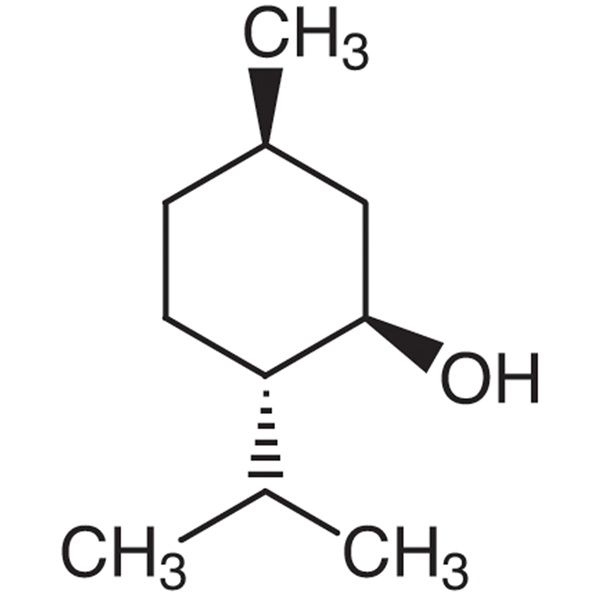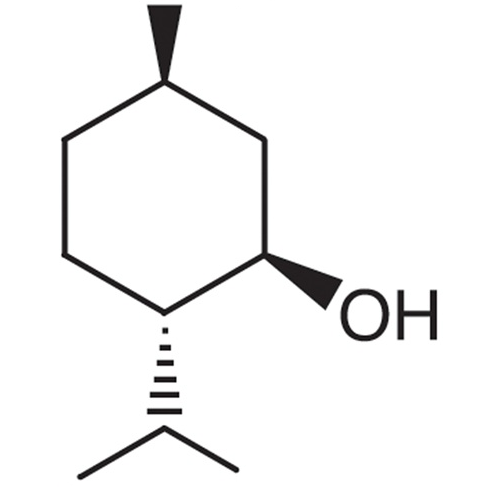Chemical Properties:
Package: Bottle, Aluminium foil bag, 25kg/Cardboard Drum, or according to customer's requirement. Storage Condition: Store in a tightly closed container. Store in a cool, dry (2~8℃) and well-ventilated warehouse away from incompatible substances. Protect from light and moisture. Shipping: Deliver to worldwide by air, by FedEx / DHL Express. Provide fast and reliable delivery. Shanghai Ruifu Chemical Co., Ltd. is the leading manufacturer of L-Menthol (CAS: 2216-51-5) with high quality. Ruifu Chemical can provide worldwide delivery, competitive price, excellent service, small and bulk quantities available. Purchase L-Menthol, Please contact: alvin@ruifuchem.comDescription:
Package/Storage/Shipping:
| Chemical Name | L-Menthol |
| Synonyms | L-(-)-Menthol; (-)-Menthol; L-Menthol; Laevo-Menthol; Menthol Crystals; (1R,2S,5R)-(-)-Menthol; (-)-p-Menthan-3-ol; 2-Isopropyl-5-Methylcyclohexanol; (1R,2S,5R)-2-Isopropyl-5-Methylcyclohexanol; 5-Methyl-2-(1-Methylethyl)cyclohexanol |
| Stock Status | In Stock, Commercial Scale |
| CAS Number | 2216-51-5 |
| Molecular Formula | C10H20O |
| Molecular Weight | 156.27 g/mol |
| Melting Point | 41.0~44.0℃ |
| Boiling Point | 211.0~213.0℃ |
| Density | 0.89 g/mL at 25℃(lit.) |
| Water Solubility | Insoluble in Water, 490 mg/l 25℃ |
| Solubility | Very Soluble in Methanol Ether |
| Odor | Asian Species with the Characteristics of Natural Menthol |
| Storage Temp. | Cool & Dry Place (2~8℃) |
| COA & MSDS | Available |
| Category | Food Additives |
| Brand | Ruifu Chemical |
Advantages:
How to Purchase? Please contact Dr. Alvin Huang: sales@ruifuchem.com or alvin@ruifuchem.com 15 Years Experience? We have more than 15 years of experience in the manufacture and export of a wide range of high quality pharmaceutical intermediates or fine chemicals. Main Markets? Sell to domestic market, North America, Europe, India, Korea, Japanese, Australia, etc. Advantages? Superior quality, affordable price, professional services and technical support, fast delivery. Quality Assurance? Strict quality control system. Professional equipment for analysis include NMR, LC-MS, GC, HPLC, ICP-MS, UV, IR, OR, K.F, ROI, LOD, MP, Clarity, Solubility, Microbial limit test, etc. Samples? Most products provide free samples for quality evaluation, shipping cost should be paid by customers. Factory Audit? Factory audit welcome. Please make an appointment in advance. MOQ? No MOQ. Small order is acceptable. Delivery Time? If within stock, three days delivery guaranteed. Transportation? By Express (FedEx, DHL), by Air, by Sea. Documents? After sales service: COA, MOA, ROS, MSDS, etc. can be provided. Custom Synthesis? Can provide custom synthesis services to best fit your research needs. Payment Terms? Proforma invoice will be sent first after confirmation of order, enclosed our bank information. Payment by T/T (Telex Transfer), PayPal, Western Union, etc.FAQ:
Stable Supply: Maintain reasonable stock
Professional Service: One stop purchasing service
Technical Support: Technology solution available
Custom Synthesis Service: Ranged from grams to kilos
Fast Delivery: If within stock, three days delivery guaranteed
High Quality: Established a complete quality assurance system
Sufficient Capacity: Sufficient facilities and technicians
OEM Package: Custom package and label available
Specifications:
| Items | Inspection Standards | Results |
| Appearance | Colorless, Transparent Prism-shaped or Needle-Like Crystals | Complies |
| Melting Point | 41.0~44.0℃ | 42.0~43.0℃ |
| Specific Rotation [a]20/D | -51.0° to -45.0° (C=10 in EtOH) | -49.9° |
| Limit of Nonvolatile Residue | ≤0.05% (105℃ for 1 Hour) | <0.05% |
| Residue on Ignition | ≤0.10% | 0.03% |
| Heavy Metals (Pb) | ≤10ppm | <10ppm |
| Arsenic (As) Content | ≤3ppm | <3ppm |
| Purity / Analysis Method | >99.5% (GC) | 99.79% |
| Infrared Spectrum | Conforms to Structure | Complies |
| NMR Spectrum | Conforms to Structure | Complies |
| Solubility in EtOH | Colorless, Clear, 100mg/ml | Pass |
| Conclusion | The product has been tested & complies with the given specifications | |
2216-51-5 - Risk and Safety:
Hazard Symbols Xi - Irritant Risk Codes R37/38 - Irritating to respiratory system and skin. R41 - Risk of serious damage to eyes R36/37/38 - Irritating to eyes, respiratory system and skin. Safety Description S26 - In case of contact with eyes, rinse immediately with plenty of water and seek medical advice. S39 - Wear eye / face protection. S37/39 - Wear suitable gloves and eye/face protection S36 - Wear suitable protective clothing. WGK Germany 2 RTECS OT0700000 TSCA Yes HS Code 2906110000 Toxicity LD50 orally in Rabbit: 3300 mg/kg LD50 dermal Rabbit > 5000 mg/kgL-Menthol (CAS: 2216-51-5) is used in cleaning products, cosmetics, flavors and fragrances, food and beverages, personal care, pharmaceutical (small molecule), cool and antipruritic drug, carminative drug. 1. Menthol crystal is often used as a food additive. Its distinct fragrance can improve appetite. 2. Menthol can be added into a wide range of oral cleaning products such as dentifrices, mouthwash, and toothpaste. 3. Menthol crystal can also be used in pharmaceutical field. As menthol has the function of inhibition and paralysis to sensory nerve endings, it can be used as a counter irritant. 4. Menthol is a edible spice allowed to be used in our country. It is mainly used for flavoring toothpaste, candies and beverages. The dosage is according to normal production needs, generally 1100mg/kg in chewing gum; 400mg/kg in candy; 130mg/kg in baked food; 68mg/kg in ice cream; 35mg/kg in soft drinks. 5. GB2760-1996 stipulates that natural thin simple brains are allowed to be used as edible spices. GB2760-2001 stipulates that the DL-type membrane brain is also allowed to be used as a food spice Chemicalbook. It can be used to prepare mint-type spices (10%-18%), and can also be used in candy (mint, gum), beverages, ice cream, etc. (amount of 0.054%-0.1%). 6. Both Menthol and racemic Menthol can be used as flavoring agents for toothpaste, perfume, beverages and candies. In medicine, it is used as a stimulant, acting on the skin or mucous membranes, and has the effect of cooling and relieving itching. It can be used as an anti-wind medicine when taken orally. Its esters are used in perfumes and medicines.Menthol USP 35 Standard:
Menthol [1490-04-6] Menthol is an alcohol obtained from diverse mint oils or prepared synthetically. Menthol may be levorotatory (L-Menthol), from natural or synthetic sources, or racemic (DL-Menthol). Packaging and storage-Preserve in tight containers, preferably at controlled room temperature. Labeling-Label it to indicate whether it is levorotatory or racemic. Identification-When it is triturated with about an equal weight of camphor, of chloral hydrate, or of phenol, the mixture liquefies. Melting range of L-Menthol <741>: between 41° and 44° Congealing range of DL-Menthol <651>-[NOTE-Perform this test preferably in a room having a temperature below 30° and a relative humidity below 50%.] Place about 10 g of racemic Menthol, previously dried in a desiccator over silica gel for 24 hours, in a dry test tube of from 18- to 20-mm internal diameter, and melt the contents at a temperature of about 40°. Suspend the test tube in water having a temperature of 23° to 25°, and stir the contents of the tube continually with a thermometer, keeping the bulb of the thermometer immersed in the liquid. Racemic Menthol congeals at a temperature between 27° and 28°. Shortly after the temperature has stabilized at the congealing point, add a few mg of dried racemic Menthol to the congealed mass, and continue the stirring: after a few minutes the temperature of the mass quickly rises to 30.5° to 32.0°. Specific rotation <781S>: between -45° and -51° for L-Menthol; between -2° and +2° for DL-Menthol. Test solution: 100 mg per mL, in alcohol. Limit of nonvolatile residue-Volatilize 2 g, accurately weighed, in a tared open porcelain dish on a steam bath, and dry the residue at 105° for 1 hour: the residue weighs not more than 1 mg (0.05%). Chromatographic purity- System suitability preparation-Dissolve decanol and Mentho in ether to obtain a solution having concentrations of about 0.05 mg of each per mL. Test preparation-Dissolve 10 mg of Menthol in 50 mL of ether, and mix. Dilute 25 mL of this solution with ether to 100mL, and mix. Chromatographic system-The gas chromatograph is equipped with a flame-ionization detector and contains a 1.8-m× 2-mm column packed with 10% phase G16 on support S1AB. The column is maintained at about 170°, the injection port is maintained at about 260°, and the detector block is maintained at about 240°. Dry helium is used as the carrier gas at a flow rate of about 50 mL per minute. Chromatograph the System suitability preparation, and record the peak responses as directed under Procedure: the retention time of menthol is about 0.7 relative to decanol. In a suitable chromatogram, the resolution R, of the 2 peaks is not less than 2.5, and the relative standard deviation of the ratio of the peak response obtained with Menthol to that obtained with decanol is not more than 2%. Procedure-Inject about 2 µL of the Test preparation into the gas chromatograph, and measure the peak responses. The peak response due to menthol is not less than 97% of the sum of all the peak responses, excluding any due to the ether. Readily oxidizable substances in DL-Menthol-Place 500mg of DL-Menthol in a clean, dry test tube, add 10 mL of a solution of potassium permanganate, prepared by diluting 3 mL of 0.1 N potassium permanganate with water to 100 mL, and place the test tube in a beaker of water at a temperature between 45° and 50°. Remove the tube from the bath at intervals of 30 seconds, and mix quickly by shaking: the purple color of potassium permanganate is still apparent after 5 minutes.Application:
Poison by intravenous route. Moderately toxic by ingestion, intraperitoneal, and subcutaneous routes. An eye irritant. Mutation data reported. When heated to decomposition it emits acrid smoke and irritating fumes.Safety Profile:


